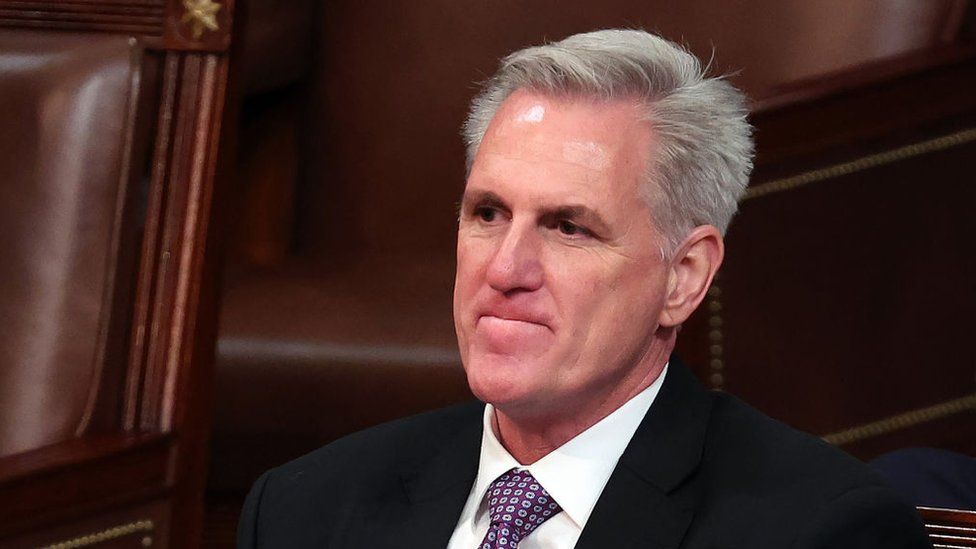ARTICLE AD BOX
 Image source, Getty Images
Image source, Getty Images
Kevin McCarthy
Angry colleagues have labelled them "enemies", "narcissists" and even "the Taliban", but the 20 Republicans blocking their leader Kevin McCarthy's bid to become speaker have not budged.
The US House of Representatives adjourned on Wednesday for a second straight night unable to elect its main presiding officer.
The magic number to earn the top job is 218 votes, a majority of the 435-seat chamber. In six consecutive rounds of voting so far, Mr McCarthy has not received the backing of more than 203 colleagues.
A gang of recalcitrant right-wingers - dubbed the "Never Kevin" crew by US media - opposes the California congressman holding the speaker's gavel and has dug in its heels over the past 72 hours.
Who are they?
The anti-McCarthy brigade is united by their anti-establishment inclinations and unrelenting nature.
At least 19 of the 20 holdouts belong to, or have aligned with, the House Freedom Caucus, the most conservative bloc of the Republican Party conference and a frequent thorn in its side.
Born out of the Tea Party movement of the late 2000s and early 2010s, the caucus on the right of the party regularly defied and sparred with then-Speaker John Boehner.
When he quit in 2015 after some bruising scrapes with them, Mr McCarthy was tipped as his successor but they withheld their support.
This time is different. The caucus - which now boasts more than 50 members - is split and some of its more notable names like Jim Jordan and Marjorie Taylor Greene, are backing Mr McCarthy.
In November, Mr McCarthy won his party's nomination for speaker behind closed doors, but some three dozen lawmakers reportedly voted against him.
And with Republicans holding only a slim 222-212 majority in the House, five "No" votes were enough this week to halt his bid for the gavel.
By December, a group of five "Never Kevins" had emerged: Andy Biggs of Arizona, Matt Gaetz of Florida, Bob Good of Virginia, Matt Rosendale of Montana, and Ralph Norman of South Carolina.
Image source, Getty Images
Image caption,Matt Gaetz (centre) leads the anti-McCarthy faction
Since voting began on Tuesday, the camp of renegades has ballooned to 20 people. They include HFC chair Scott Perry of Pennsylvania, controversial lawmakers Lauren Boebert of Colorado and Paul Gosar of Arizona, and five newly-elected members: Andy Ogles of Tennessee, Anna Paulina Luna of Florida, Eli Crane of Arizona, Josh Brecheen of Oklahoma and Keith Self of Texas.
What do they want?
The rebels in the party have suggested that Mr McCarthy is too closely aligned with a broken system and will do little to change how Washington is governed.
"The American people want us to turn a page. They do not want excuses or performance art, they want action and results," Mr Biggs wrote on Twitter, as he launched a longshot bid for speaker himself.
He called for changing the "status quo" by reforming such things as how bills can be amended and how bills are brought to the floor.
Watch: Kevin McCarthy's whirlwind Tuesday - in 90 seconds
The holdouts have also sought to extract various concessions in exchange for their support, including promises to vote on bills that address congressional term limits and border security, and changes to the procedure by which to oust a sitting speaker.
But several of their detractors within the party have attacked them for prioritising procedural changes over making policy, as well as for demanding personal favours like committee assignments.
"Some of the reasons these people who oppose Kevin McCarthy have are unbelievably petty," Texas congressman Dan Crenshaw told Fox News. "It makes us look foolish."
"Wake up to political reality and remember who the enemy is," Ms Taylor Greene, who is among Mr McCarthy's key backers, wrote on Twitter.
It is unclear how much longer Mr McCarthy can keep negotiating concessions and, if he stops, whether he can realistically remain in the race. No serious alternative names have yet been proposed.
However the fight ends, the Republican Party's hardliners are more emboldened than ever.
Asked how long he was willing to let the votes for speaker go on, Mr Norman - one of the original five dissenters - replied: "Six more months."

 2 years ago
43
2 years ago
43








 English (US) ·
English (US) ·